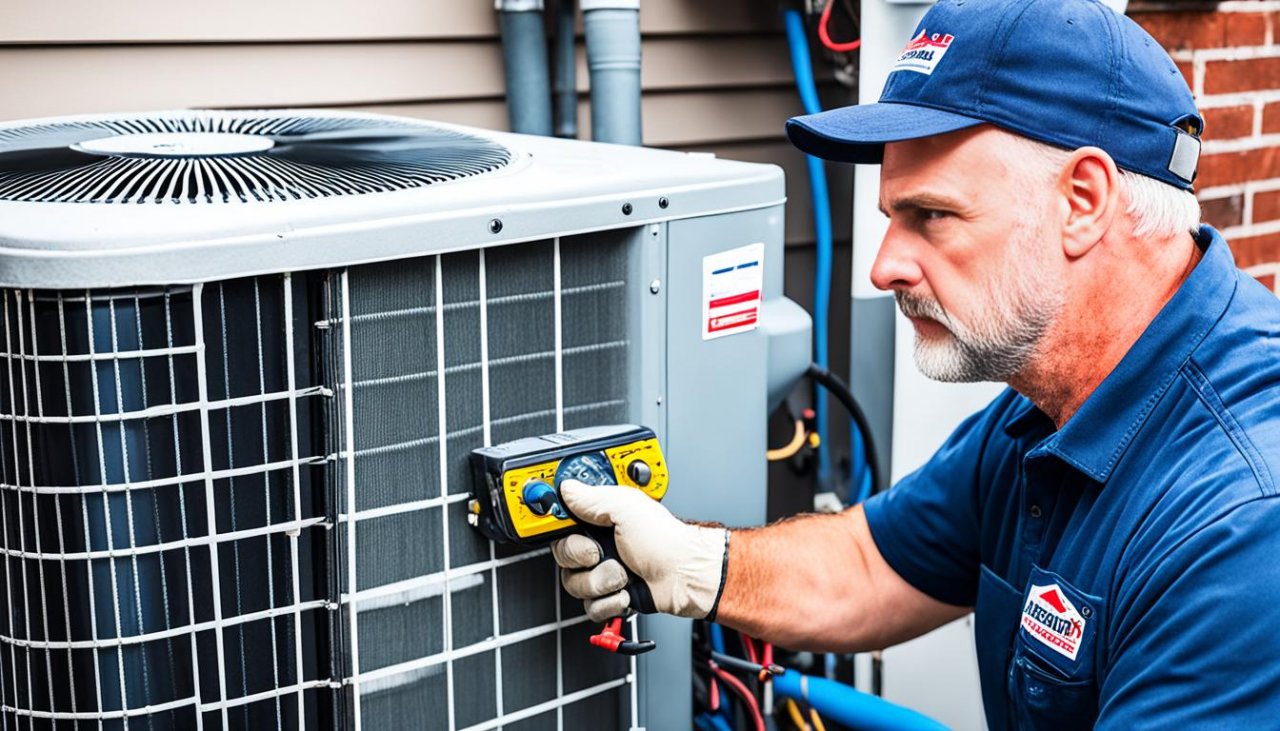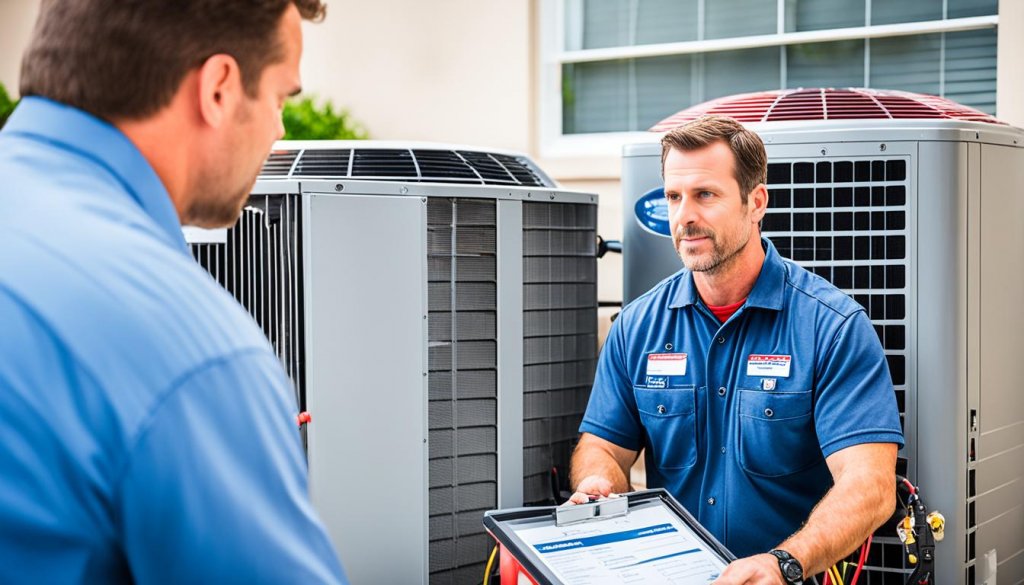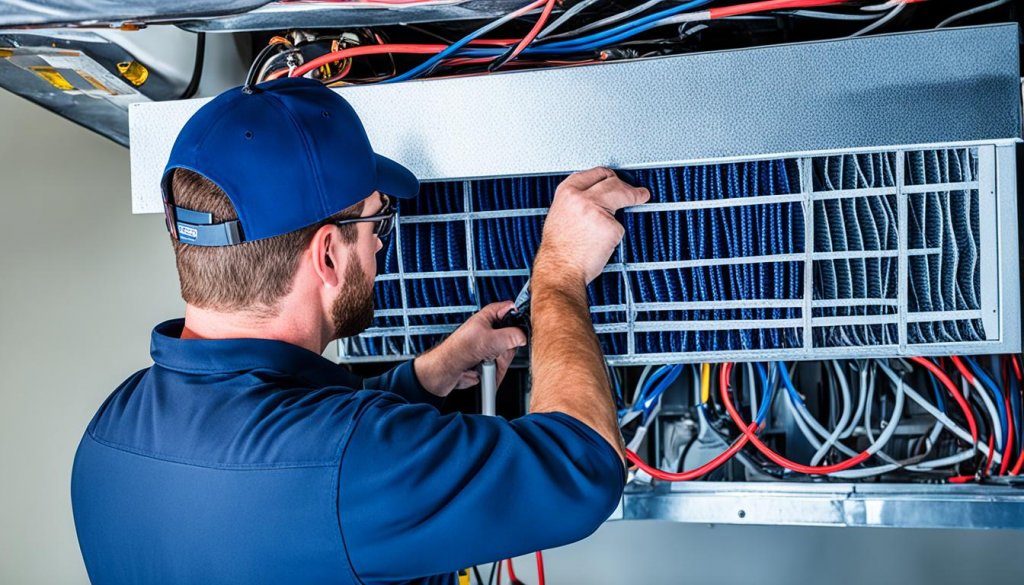Running a successful HVAC business goes beyond just providing high-quality services. It’s about ensuring customer satisfaction and delivering exceptional customer service. As an HVAC professional, I understand the importance of building strong relationships with customers and going the extra mile to meet their needs.
Let me share a personal experience that highlights the impact of excellent HVAC customer service. Last summer, when the scorching heat engulfed our neighborhood, my air conditioner suddenly broke down. I was frustrated and desperate for a quick solution. With a quick online search, I found a renowned HVAC company with glowing customer reviews.
Expecting a long wait, I called their customer service hotline, prepared for an automated menu and long hold times. To my pleasant surprise, I was greeted by a friendly and knowledgeable customer service representative (CSR). The CSR listened attentively to my problem and assured me that they would send a technician to my house as soon as possible.
Within the next hour, a skilled HVAC technician arrived at my doorstep. He was professional, courteous, and efficiently diagnosed and fixed the issue. Throughout the repair process, he patiently explained the problem and answered all of my questions.
The outstanding customer service experience didn’t stop there. After completing the repair, the company’s CSR followed up to ensure everything was working smoothly. This thoughtful gesture made a lasting impression on me, and I knew I had found a trustworthy HVAC service provider.
This anecdote illustrates how exceptional customer service can turn a frustrated customer into a loyal advocate. By prioritizing customer satisfaction and treating each interaction as an opportunity to build trust, HVAC businesses can enhance their brand reputation and foster long-term customer loyalty.
In this comprehensive guide, we will delve into the importance of HVAC customer service, the role of the HVAC customer service representative (CSR), and actionable tips for enhancing customer satisfaction. Whether you’re a seasoned HVAC professional or just starting in the industry, these insights will help you deliver top-notch service and grow your business.

Key Takeaways:
- Delivering excellent customer service is crucial for the success and growth of HVAC businesses.
- Building trust and fostering customer loyalty through exceptional HVAC customer service can generate positive reviews and referrals.
- Caring, knowledgeable, and responsive CSRs play a central role in handling customer inquiries, appointments, and complaints.
- Important HVAC customer service skills include effective communication, active listening, technical expertise, and patience.
- Investing in employee training, market research, and incorporating technology can significantly enhance the customer experience and improve service quality.
The Importance of HVAC Customer Service
HVAC customer service plays a pivotal role in the success of any HVAC business. By prioritizing customer satisfaction, HVAC companies can not only attract new clients but also retain existing ones. Providing excellent customer service is crucial for growing the business, boosting profits, and establishing a positive reputation. In this section, we will explore HVAC service excellence tips and HVAC customer satisfaction tips to help your business thrive.
Podium Platform for Efficient Customer Reach
The Podium platform offers a powerful solution for HVAC businesses to streamline customer reach. With this platform, businesses can connect with customers five times faster, facilitating business growth without compromising customer satisfaction.
Utilizing AI Assistant Technology for Efficient Operations
AI Assistant technology plays a vital role in organizing high-level operations and enhancing workflow efficiency in the HVAC industry. By utilizing AI Assistant technology, HVAC businesses can refine their workflows and improve overall performance.
Leveraging Field Service Management and CRM Software
Field service management software, CRM software, and customer service tools are essential tools for HVAC businesses. These software solutions streamline processes, improve communication, and enhance overall efficiency, ensuring a seamless experience for both customers and technicians.
Proactive Use of HVAC Management Tools
Proactively using HVAC management tools, such as the AI Review Response Generator, can significantly enhance customer loyalty and improve online reputation. By promptly addressing customer feedback and reviews, HVAC businesses can demonstrate their commitment to customer satisfaction.
Continuous Learning and Upskilling for Technicians
Emphasizing continuous learning and upskilling for technicians is crucial in improving HVAC service quality and customer satisfaction. By investing in the professional development of technicians, businesses can provide customers with the highest level of expertise and service.
Providing Competitive Pay and Incentives for Continuous Education
Offering competitive pay and incentives for continuous education can help HVAC businesses retain skilled technicians and foster a culture of excellence. By valuing and investing in their employees, businesses can ensure a high standard of service for their customers.
Efficient Dispatching and Routing Workflows
Efficient dispatching and routing workflows are essential for maintaining smooth operational performance in HVAC businesses. By optimizing these workflows, businesses can ensure timely service delivery and customer satisfaction.
Remote Access to Job Information
Providing remote access to job information can significantly improve efficiency and customer service in HVAC businesses. Technicians can access real-time information, track service requests, and update job statuses, resulting in better communication and faster response times.
Transparent Communication with Customers
Transparent communication with customers is paramount in setting expectations and building trust. By ensuring clear and open lines of communication, HVAC businesses can foster long-term relationships with customers and strengthen their online reputation.
Creating a Solid HVAC Business Plan
Creating a solid HVAC business plan helps establish a clear direction and purpose for the company. It serves as a roadmap for success, guiding business decisions and ensuring a customer-centric approach throughout the organization.
Streamlining Invoicing and Payment Processes
Streamlining invoicing and payment processes is essential for improving cash flow in HVAC businesses. By implementing efficient systems and technologies, businesses can simplify transactions, reduce payment delays, and enhance customer satisfaction.
Personalizing and Professionalizing Estimates
Personalizing and professionalizing estimates helps HVAC businesses stand out from competitors. By presenting clear and detailed estimates in a professional manner, businesses can instill confidence in customers and showcase their commitment to quality service.
By implementing these HVAC service excellence tips and HVAC customer satisfaction tips, businesses can elevate their customer service and stand out in the HVAC industry. Providing top-notch service not only fosters customer loyalty but also sets the stage for sustainable business growth.
The Role of the HVAC Customer Service Representative
The HVAC Customer Service Representative (CSR) is a vital link between HVAC companies and their customers. As the first point of contact, the CSR plays a crucial role in ensuring customer satisfaction and building trust. Effective service strategies for HVAC companies and HVAC quality control methods are essential for CSRs to excel in their role.

One of the key responsibilities of a HVAC CSR is managing customer calls. Timely responses to inquiries, providing accurate information, and addressing concerns promptly contribute to customer satisfaction. A friendly and professional tone during interactions is crucial to maintaining a high level of professionalism and fostering positive customer relationships.
The CSR also plays a pivotal role in appointment booking and management. Efficient scheduling ensures that customers’ time is valued and appointments are fulfilled on time. By avoiding delays and conflicts, CSRs can help prevent customer complaints and enhance overall service quality.
Maintaining a clean and tidy work site is another aspect where CSRs can contribute to the professionalism of the business. A clean work site not only demonstrates attention to detail but also increases the likelihood of positive word-of-mouth referrals from satisfied customers.
Automation of customer service processes can be a game-changer for HVAC businesses. Implementing systems for communication, response times, and presentation can streamline operations and improve service quality. Automated notifications about technician arrival times can enhance efficiency and professionalism in customer interactions.
CSRs can also serve as a valuable resource for customers by actively listening to their needs and suggesting upgrades to higher efficiency equipment. This not only improves customer satisfaction but also increases the likelihood of repeat business as customers appreciate the value and cost-saving benefits of upgrading their HVAC systems.
By providing exceptional customer service, CSRs can encourage satisfied customers to leave positive reviews. These reviews not only improve the company’s SEO and credibility but also lead to more work through referrals. In fact, 93% of consumers are more likely to be repeat customers when companies have excellent customer service, and 83% of Americans say a word-of-mouth recommendation from a family member or friend makes them more likely to choose a product or service.
In summary, the role of an HVAC Customer Service Representative is multifaceted and critical for the success of an HVAC company. By implementing effective service strategies and HVAC quality control methods, CSRs can contribute to customer satisfaction, service excellence, and the overall growth of the business.
Creating a Skilled HVAC Customer Service Team
Building a skilled HVAC customer service team is crucial for delivering top-notch service to customers. As an HVAC service provider, it’s essential to focus on hiring and training customer service representatives (CSRs) who possess strong communication skills and technical HVAC knowledge. By investing in the development of your CSRs, you can ensure that they have the expertise and tools necessary to provide exceptional customer service.
One of the best practices for HVAC service providers is to offer ongoing education and training opportunities for CSRs. These programs can include HVAC customer service training, which covers topics such as understanding HVAC systems, troubleshooting common issues, and effectively communicating with customers. By equipping CSRs with the knowledge and skills they need, they will be better equipped to handle customer inquiries, address concerns, and provide accurate information about your HVAC services.
Creating a supportive company culture is also essential in building a skilled HVAC customer service team. When employees feel valued and empowered, they are more likely to perform at their best. Encourage open communication, provide opportunities for growth and advancement, and recognize and reward exceptional performance. By fostering a positive work environment, you can motivate your CSRs to deliver exceptional customer service and contribute to the overall success of your HVAC business.
Implementing digital tools and technologies can also enhance the capabilities of your HVAC customer service team. For example, refrigerant gauges and multimeters can improve accuracy and efficiency in diagnosing HVAC system issues. By using these advanced tools, CSRs can provide more accurate information to customers and ensure that technicians have the necessary information to perform repairs and maintenance effectively.
Furthermore, it’s important to provide CSRs with the proper safety equipment to ensure their well-being while on the job. Gloves, masks, earmuffs, goggles, and durable shoes are essential to protect against potential hazards. By prioritizing the safety of your team, you not only demonstrate your commitment to their well-being but also contribute to their overall job satisfaction and morale.
Remember, a skilled HVAC customer service team is instrumental in building a positive reputation for your business. By providing exceptional service, maintaining a professional appearance, leaving work sites clean and tidy, and encouraging satisfied customers to leave reviews, you can enhance your credibility, attract new customers, and generate more business opportunities.
In conclusion, creating a skilled HVAC customer service team requires a combination of hiring the right individuals, providing ongoing education and training, fostering a supportive company culture, equipping them with the right tools and safety equipment, and emphasizing the value of exceptional service. By implementing these top tips for quality HVAC services, you can elevate your customer service game and set your HVAC business up for success.
Tips for Enhancing Customer Satisfaction in HVAC Businesses
Enhancing customer satisfaction is crucial for the success of HVAC businesses. By prioritizing customer service excellence and implementing effective strategies, HVAC companies can exceed customer expectations, foster strong relationships, and build a reputation for delivering exceptional service.
1. Effective Communication
Establishing successful client relationships starts with effective communication. Timely and transparent communication helps customers feel heard, understood, and valued. It is important to actively listen to customers, address their concerns, and provide clear explanations to ensure their satisfaction.
2. Prompt Response and Resolution
In a fast-paced business environment, prompt response and resolution are vital. Timely action on customer inquiries, requests, or complaints demonstrates a commitment to their satisfaction. HVAC businesses should strive to resolve issues quickly, efficiently, and to the customer’s satisfaction.
3. Delivering Exceptional Customer Service
Well-trained and empowered employees play a crucial role in delivering excellent customer service. HVAC companies should invest in ongoing training and development programs to equip their technicians with the skills and knowledge to provide exceptional service. Friendly, professional, and courteous interactions leave a lasting impression on customers and increase their satisfaction.
4. Embrace Technological Advancements
Embracing technological advancements in the HVAC industry can enhance the customer experience. Utilize tools like infrared imaging and sensor-based diagnostics to improve troubleshooting time and minimize customer downtime. Energy-efficient solutions such as Variable-Speed Motors and Smart thermostats not only save customers money but also position businesses as leaders in sustainable HVAC systems.
5. Utilize Customer Feedback for Continuous Improvement
Feedback from customers is invaluable for identifying areas of improvement. HVAC companies should encourage customers to provide feedback and use that information to continuously improve their services. By showing customers that their opinions are valued and using their feedback to make necessary changes, HVAC businesses can enhance customer satisfaction and loyalty.
6. Offer Maintenance Plans and Regular Check-ups
Preventive maintenance is key to avoiding costly breakdowns and extending the lifespan of HVAC equipment. By offering maintenance plans and regular check-ups, HVAC businesses can provide peace of mind to customers and prevent unexpected issues. A well-maintained system leads to higher customer satisfaction and reduces the likelihood of emergency repairs.
7. Address Service Limitations Transparently
No business is immune to service limitations or occasional issues. It is important to address these limitations transparently and honestly with customers. Providing accurate estimates, setting realistic expectations, and being upfront about potential challenges build trust and credibility. Customers appreciate transparency and are more likely to be satisfied when they know what to expect.

By implementing these tips for enhancing customer satisfaction, HVAC businesses can stand out from competitors and foster long-term relationships with their clients. When HVAC companies prioritize service excellence and go the extra mile for their customers, they can reap the rewards of repeat business, valuable referrals, and a strong brand reputation.
The Role of Technology in HVAC Customer Service
As the HVAC industry continues to evolve, technology plays a crucial role in providing effective service strategies for HVAC companies and ensuring customer satisfaction. By leveraging various technological tools and solutions, HVAC businesses can streamline operations, enhance efficiency, and deliver a superior customer experience.
One of the key ways technology supports HVAC customer service is through the use of advanced software. HVAC software platforms like ServiceTitan provide valuable features that can significantly improve customer service call times. By equipping customer service representatives with essential customer information before answering calls, these platforms reduce the time spent gathering information and allow representatives to address customer needs promptly and efficiently(HVAC maintenance guide).
Improved call booking systems are another technological advancement that enhances HVAC customer service. These systems increase efficiency by allowing customer service representatives to greet customers by name and expedite the appointment booking process(Effective service strategies for HVAC companies). This personalized approach not only saves time but also creates a positive first impression and establishes a strong foundation for the customer relationship.
Automation is a powerful tool in HVAC customer service, enabling companies to streamline processes and save time. Automated appointment confirmation processes, such as SMS notifications, can save customer service representatives up to 12 hours per week(HVAC maintenance guide). By automating these tasks, HVAC businesses can focus on providing personalized service to their customers, ensuring that their needs are met in a timely and efficient manner.
The Impact of GPS Tracking and Real-Time Updates
Implementing GPS tracking technology in HVAC software has revolutionized the industry by improving response times and customer satisfaction. Real-time monitoring of field technician locations allows for efficient dispatching and reduces travel time. This not only enhances the overall customer experience but also helps HVAC businesses maintain punctuality and keep customers informed(Effective service strategies for HVAC companies).
Real-time tracking of technician progress is another technological advancement that contributes to customer satisfaction. By providing accurate appointment windows and updates, HVAC businesses can offer transparency and keep customers informed throughout the service process. This helps build trust and confidence in the company’s services, leading to enhanced customer satisfaction(Effective service strategies for HVAC companies).
Empowering HVAC Technicians with Mobile Technology
Mobile technology has transformed how HVAC technicians deliver personalized service to customers. Tools like ServiceTitan Mobile equip technicians with comprehensive customer information, from job history to outstanding estimates. This enables them to provide tailored and efficient service, addressing specific customer needs and ensuring a high level of satisfaction(Effective service strategies for HVAC companies).
Mobile technology also enables on-site estimates and payments, enhancing the customer experience by providing quick and transparent service pricing and payment options. Customers appreciate the convenience and efficiency of these mobile capabilities, which contribute to a positive service experience and customer satisfaction(HVAC maintenance guide).
Integration and Automation for Streamlined Processes
Integration with financing providers through HVAC software is another valuable technology that enhances the customer service experience. By offering on-the-spot financing options, HVAC businesses streamline payment processes for customers and improve financial transactions(HVAC maintenance guide).
Automation through text or email notifications is yet another effective customer service strategy made possible by technology. These automated updates provide customers with important information such as appointment times, service status, and schedule changes. By staying engaged and informed, customers feel valued and satisfied with the HVAC services they receive(HVAC maintenance guide).
Online Scheduling and Proactive Communication
Online scheduling and appointment tracking platforms save time for both HVAC businesses and customers, offering a convenient booking experience. Customers appreciate the flexibility and ease of scheduling appointments online, contributing to an improved customer service experience in the HVAC industry(HVAC maintenance guide).
Proactive communication is a key element of effective HVAC customer service. By reaching out to customers about their maintenance needs and providing tips for HVAC system maintenance, companies can help customers avoid costly repairs and enhance loyalty. This personalized approach demonstrates care and builds trust in the company’s services(Effective service strategies for HVAC companies).
By embracing technology and leveraging its potential, HVAC businesses can enhance customer service, improve efficiency, and stay competitive in a rapidly evolving industry. Adopting and integrating the right technological tools and solutions is essential for delivering quality service and ensuring customer satisfaction in the HVAC market(HVAC maintenance guide, Effective service strategies for HVAC companies).
Marketing Strategies for HVAC Businesses
Effective marketing strategies are vital for HVAC companies to increase their customer base and achieve business growth. To stand out in a competitive industry, HVAC businesses need to employ various marketing tactics that can effectively attract new customers and build a strong reputation. Here are some key marketing strategies that HVAC companies should consider:
1. Integrated Online and Offline Marketing
An integrated marketing approach that combines online and offline strategies can yield great results for HVAC businesses. This includes utilizing digital marketing techniques such as search engine optimization (SEO), pay-per-click (PPC) advertising, and social media marketing to increase online visibility. Additionally, offline marketing methods like direct mail campaigns and out-of-home advertising can target local audiences effectively.
2. Showcasing Unique Selling Points
It’s essential for HVAC companies to highlight their unique selling points to differentiate themselves from competitors. Whether it’s exceptional customer service, highly-trained technicians, or energy-efficient solutions, showcasing these qualities in marketing materials and on the company website can help attract customers who value these specific attributes.
3. Utilizing Customer Testimonials and Case Studies
Customer testimonials and case studies are powerful tools for building trust and credibility with potential customers. HVAC companies can feature positive reviews and real-life success stories on their website and social media platforms. This social proof demonstrates the company’s expertise and customer satisfaction, increasing the likelihood of attracting new customers.
4. Monitoring Key Performance Indicators (KPIs)
To ensure the effectiveness of marketing efforts, HVAC businesses must monitor key performance indicators (KPIs). Tracking metrics such as website traffic, conversion rates, and customer acquisition costs can provide valuable insights into the success of marketing campaigns. By analyzing this data regularly, businesses can make data-driven decisions to optimize their marketing strategies.
5. Grassroots HVAC Marketing
Grassroots marketing is an often overlooked strategy for attracting local customers. It involves building brand awareness and trust within the community through personalized visibility, networking events, and customer referrals. By actively engaging with the local community, HVAC companies can strengthen their presence and establish lasting customer relationships.
In conclusion, implementing effective marketing strategies is crucial for HVAC businesses to increase their customer base and achieve growth. By utilizing integrated online and offline marketing, showcasing unique selling points, utilizing customer testimonials and case studies, monitoring KPIs, and leveraging grassroots marketing, HVAC companies can enhance their visibility, build customer trust, and attract new business opportunities.
The Importance of Company Culture in HVAC Businesses
Building a positive company culture is essential for the success of HVAC businesses. A strong company culture not only enhances employee satisfaction and productivity but also plays a crucial role in attracting and retaining top talent in the industry. By prioritizing effective service strategies and HVAC quality control methods, HVAC companies can create a work environment that fosters growth, innovation, and customer satisfaction.
Research shows that disengaged employees are 2.8× more likely to leave their current organization for one with a more positive company culture. This highlights the critical role that company culture plays in employee retention and loyalty within the HVAC business.
In addition to improving employee retention, a positive workplace culture can help prevent burnout among HVAC and plumbing technicians. With 77% of employees experiencing burnout, it is crucial for HVAC businesses to create a supportive work environment that alleviates stress and promotes well-being.
Attracting and Retaining Top Talent
Establishing clear company values is a paramount step in cultivating a positive company culture. By placing emphasis on customer service, professionalism, and technical expertise, HVAC businesses can attract employees who align with the company’s ethos. This ensures that the team is composed of individuals who are committed to providing excellent service to customers.
HVAC industry statistics indicate that a positive company culture is essential for attracting and retaining talented individuals in the HVAC business. Nearly 9 in 10 employees state that feeling happy and engaged at work drives their productivity, highlighting the need to prioritize employee satisfaction in order to retain top talent and maintain high levels of performance.
Enhancing Team Dynamics and Client Satisfaction
Effective communication strategies are integral to fostering a positive company culture in HVAC businesses. Open and transparent communication channels enhance team dynamics, encourage collaboration, and ultimately contribute to client satisfaction. By promoting effective communication both within the team and with clients, HVAC businesses can build strong relationships and deliver personalized services that enhance customer experiences.
Furthermore, hiring individuals based on cultural fit and providing training programs and career development opportunities are essential elements for a strong HVAC company culture. Investing in employee growth and development not only improves individual performance but also contributes to the overall success of the business.
Continuous Evaluation and Improvement
Continuous evaluation and improvement of the company’s culture are vital for long-term success. Regular feedback from team members and clients is crucial for identifying areas that need enhancement and implementing necessary changes. This ensures that the company culture remains adaptive and aligned with the evolving needs of the HVAC industry.
By prioritizing a positive company culture, HVAC businesses can enjoy the tangible benefits of increased customer satisfaction, higher employee retention rates, and ultimately, improved profitability. Embracing a positive company culture encourages innovation, problem-solving, and a commitment to customer satisfaction among employees, ultimately setting the stage for long-term success in the HVAC industry.
Conclusion
Managing an HVAC business and ensuring customer satisfaction requires a comprehensive approach that incorporates various strategies and technologies. By implementing quality service tips, improving HVAC service quality, embracing technology, and prioritizing employee training and company culture, HVAC businesses can enhance their service offerings and exceed customer expectations. From implementing smart HVAC systems and Geothermal Heat Pumps to leveraging specialized HVAC software platforms and conducting Home Performance Audits, there are numerous ways to optimize operations and improve the overall customer experience in the HVAC industry.
Customer communication strategies that empower customers and provide transparency, along with internal communication strategies that foster collaboration and alignment within the team, are crucial for success. Additionally, online marketing, community engagement, and establishing an effective online presence can significantly boost visibility and customer loyalty for HVAC businesses. Providing value, maintaining reliability, and continuously evaluating and improving the customer experience are essential for long-term success.
By listening to customers, being responsive to their needs, and continuously incorporating their feedback, HVAC businesses can establish trust, build strong relationships, and develop a loyal customer base. Embracing new technologies, investing in employee training, and adopting best practices in customer service can ultimately differentiate HVAC businesses from competitors and position them as industry leaders. With a focus on quality service, customer satisfaction, and continuous improvement, HVAC businesses can thrive in today’s competitive market.
See how FieldAx can transform your Field Operations.
Try it today! Book Demo
You are one click away from your customized FieldAx Demo!
FAQ
What is HVAC customer service?
HVAC customer service refers to managing the entire customer experience, from the initial call to the resolution of their HVAC issue. It involves providing prompt and effective communication, addressing customer questions and concerns, and ensuring customer satisfaction.
Why is HVAC customer service important for HVAC businesses?
HVAC customer service is crucial for the growth and success of HVAC businesses. It helps improve customer retention, generate referrals, and boost profits. By providing high-quality customer service, HVAC companies can increase demand for their services and establish trust with their customers.
What is the role of the HVAC Customer Service Representative (CSR)?
The HVAC CSR manages customer calls, books appointments, handles customer questions, and resolves complaints or concerns. They are the first point of contact for customers and play a crucial role in ensuring customer satisfaction. Effective service strategies and quality control methods are necessary to ensure that CSRs provide excellent customer service.
How can HVAC companies create a skilled HVAC customer service team?
HVAC companies should focus on hiring and training CSRs with strong communication skills and technical HVAC knowledge. Providing education and training opportunities, such as HVAC customer service training programs, will help CSRs develop the necessary skills to deliver exceptional customer service. Additionally, creating a supportive company culture and empowering employees will contribute to a skilled and motivated customer service team.
What are some tips for enhancing customer satisfaction in HVAC businesses?
Some tips for enhancing customer satisfaction in HVAC businesses include effective communication, prompt response and resolution, delivering exceptional customer service, embracing technological advancements, utilizing feedback to improve, offering maintenance plans and regular check-ups, and addressing service limitations transparently. By implementing these strategies, HVAC companies can exceed customer expectations and build strong relationships with their clients.
How can technology improve HVAC customer service?
Technology plays a significant role in HVAC customer service. Utilizing scheduling software, diagnostic tools, and energy-efficient equipment can streamline operations, improve efficiency, and enhance the overall customer experience. Automation tools, such as invoicing software and customer relationship management systems, can minimize paperwork and administrative tasks, allowing HVAC companies to focus on delivering quality service.
What marketing strategies can HVAC businesses employ to attract customers?
Effective marketing strategies for HVAC businesses include creating an integrated marketing strategy that includes online and offline modes of communication, showcasing unique selling points, and utilizing customer testimonials and case studies. Monitoring key performance indicators (KPIs) and measuring the success of marketing efforts is crucial for making informed business decisions and continuously improving marketing strategies.
How does company culture impact HVAC businesses?
A positive company culture, characterized by a supportive work environment, recognition and appreciation of employees, teamwork, and open communication, enhances employee morale, improves performance, and ultimately leads to higher customer satisfaction. Investing in employee training and development is also crucial for staying ahead of industry trends and providing excellent service.
What is the key to improving HVAC service quality?
Managing an HVAC business and ensuring customer satisfaction requires a multifaceted approach. By implementing quality service tips, focusing on effective HVAC customer service, embracing technology, and prioritizing employee training and company culture, HVAC businesses can maximize efficiency, enhance customer satisfaction, and achieve sustainable growth. Continuous improvement, monitoring key performance indicators, and staying updated with industry trends are also crucial for long-term success in the HVAC industry.
Author Bio
Co-Founder & CMO at Merfantz Technologies Pvt Ltd | Marketing Manager for FieldAx Field Service Software | Salesforce All-Star Ranger and Community Contributor | Salesforce Content Creation for Knowledge Sharing






